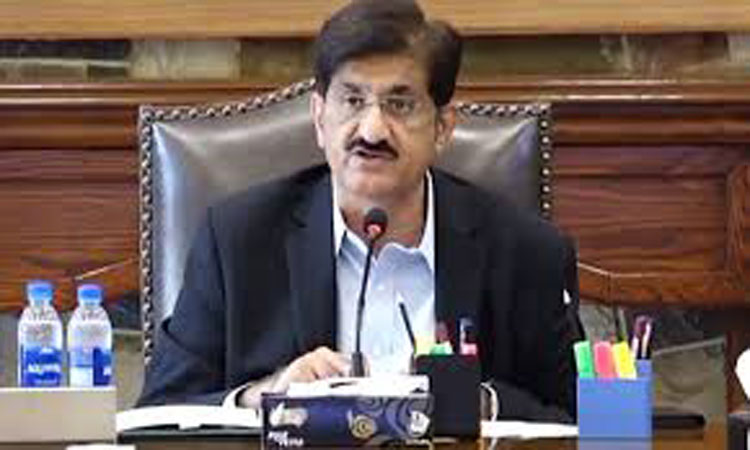 Sindh Chief Minister Syed Murad Ali Shah and the World Bank delegation, headed by Country Director Najy Benhassine thoroughly reviewed the $3.124 billion Sindh portfolio to establish new deadlines for various development projects.
Sindh Chief Minister Syed Murad Ali Shah and the World Bank delegation, headed by Country Director Najy Benhassine thoroughly reviewed the $3.124 billion Sindh portfolio to establish new deadlines for various development projects.
The high-level meeting, which took place at the CM House on Thursday was attended by provincial ministers, the Chief Secretary and other key officials, while the World Bank team included sector heads to assist in the review process.
The active Sindh portfolio includes 13 development projects, of which $1.36 billion has already been disbursed by the World Bank. The projects span a wide range of sectors, including water management, infrastructure, solar energy, education and health services. Some of the key initiatives under review were the Karachi Mobility Project (KMP), Sindh Flood Emergency Rehabilitation Project (SFERP), Sindh Flood Housing Emergency Reconstruction Project (SFHERP), and Karachi Water and Sewerage Services Improvement Project (KWSSIP).
Sindh Flood Emergency Rehabilitation Project (SFERP) aimed at rebuilding infrastructure and providing livelihood support to areas affected by the 2022 floods and focuses on improving Sindh’s capacity to respond to climate-related disasters. The $500 million project consists of four major components: Infrastructure Rehabilitation, Livelihood Support, Institutional Strengthening and Project Management. It was noted in the meeting that payment backlogs have been significantly reduced and they are expected to be cleared by the end of the month.
Sindh Flood Housing Emergency Reconstruction Project (SFHERP) is working towards multi-hazard resilient housing reconstruction in flood-hit areas. With a budget of $500 million, the project has three main components: Housing Reconstruction Grants, Institutional Strengthening, and Project Management. The meeting revealed that landless individuals have been granted land and their titles are being transferred to them as part of the project’s broader effort to secure housing for flood victims.
Karachi Mobility Project (KMP) is aimed at improving mobility and safety along key corridors in Karachi, includes the construction of the Yellow Line Bus Rapid Transit (BRT) system. This project has three components: Urban Road Infrastructure, BRT System Development and Capacity Building. Significant progress has been made on the Yellow Line, with contracts signed in August 2024 and mobilization underway. Work has already commenced at Depot 2, and the construction of Depot 1 is scheduled to begin on October 17, 2024. Final designs for the Yellow Line and the Jam Sadiq Bridge have been submitted and piling work has started. A business model for the BRT system has also been presented and is currently under review, with the final report due by October 12, 2024.
Competitive and Liveable City of Karachi Project (CLICK) is designed to enhance urban management, improve service delivery and bolster the business environment in Karachi. The project includes five components, ranging from capacity building for local councils to improving property tax administration and technical assistance for solid waste management.
The meeting disclosed that nine contracts have been signed and work has commenced on all 18 schemes, including 73 initiatives under the $22.58 million fund for local councils. A pilot property survey conducted between August 15-22, 2024, in the Gulberg and North Nazimabad areas yielded data from 100 units.
Karachi Water and Sewerage Services Improvement Project (KWSSIP), focused on improving access to safe water in Karachi, was also discussed in the meeting. The project involves major procurements, most of which are now tendered. It was noted that contracts are expected to be signed by October 20, 2024, with a commitment level expected to reach 95%. The appointment of key roles, such as a Chief Financial Officer, will be completed by mid-November this year, and progress remains on track to achieve project milestones.
Sindh Solar Energy Project (SSEP) aims to expand solar power generation and improve access to electricity across Sindh. During the review, it was noted that the first contract for Solar Home Systems (SHS) has been signed and the shipment of solar kits is expected to arrive in November 2024. Procurement for the second call-off will begin by mid-October. Additionally, progress on the development of Solar Power Parks has advanced, with a land lease agreement nearing finalization.
Sindh Early Learning Enhancement through Classroom Transformation (SELECT) project focuses on improving early-grade education in Sindh.
The project has successfully secured a $2.3 million budget allocation and civil works have begun in Mirpurkhas, with Thatta following suit. The first batch of materials for Grade 1-2 students will be delivered by January 2025, while materials for Grades 3-5 are expected to reach classrooms by April 2025.
Sindh Water and Agriculture Transformation Project (SWAT) project aims to improve water resource management and agricultural productivity in flood-affected areas. A recent contract for water service delivery was awarded, and teams from both national and international institutions have been mobilized. The committee overseeing the Akram Wah canal rehabilitation has agreed to proceed with a lining option for the canal’s design.
The review session between Chief Minister Murad Ali Shah and the World Bank delegation reflects the ongoing commitment to enhancing the quality of life in Sindh through a diverse portfolio of development projects.
The timely completion of these initiatives will not only improve infrastructure and service delivery but also bolster the province’s resilience to future challenges, including climate change and natural disasters.